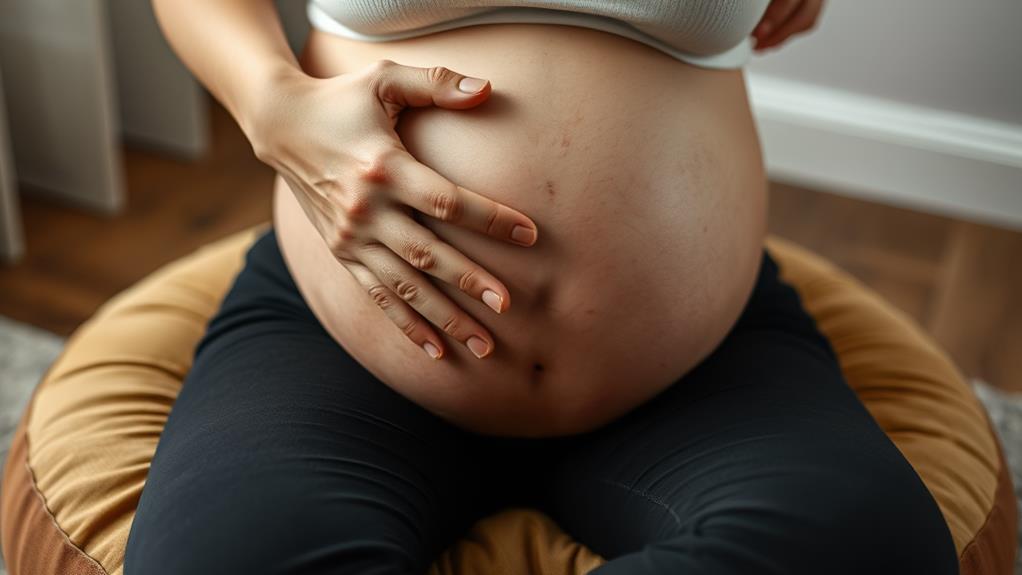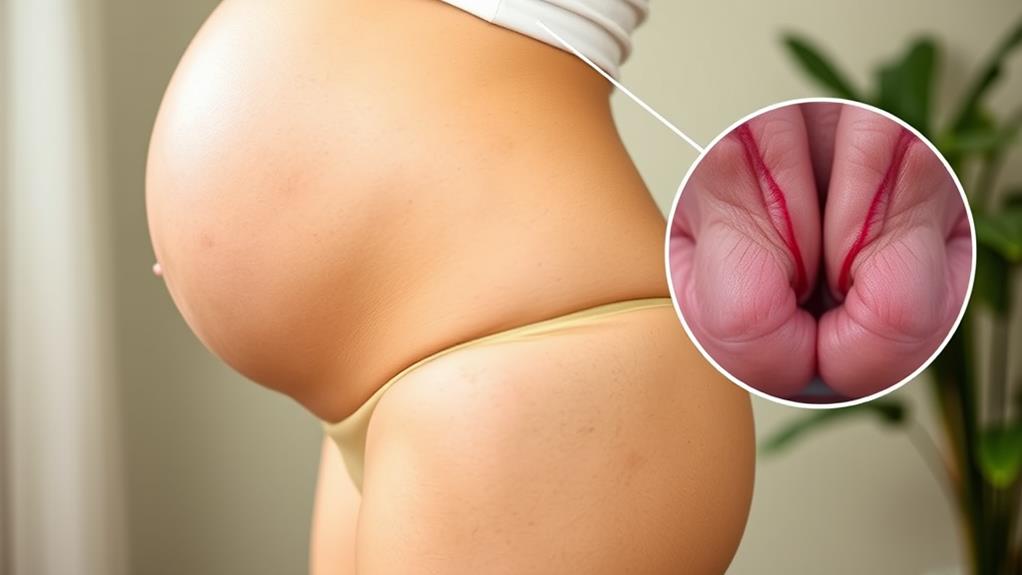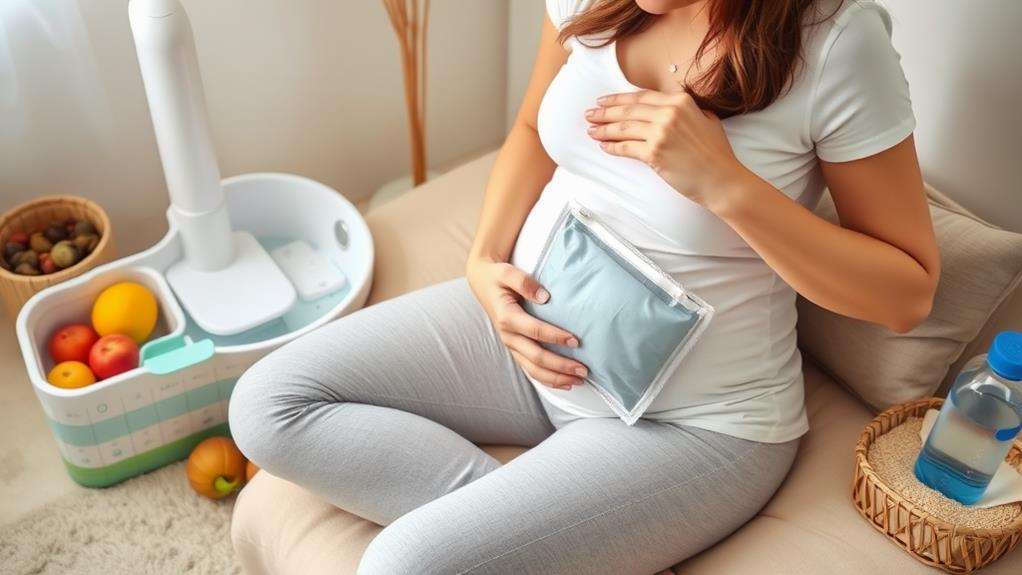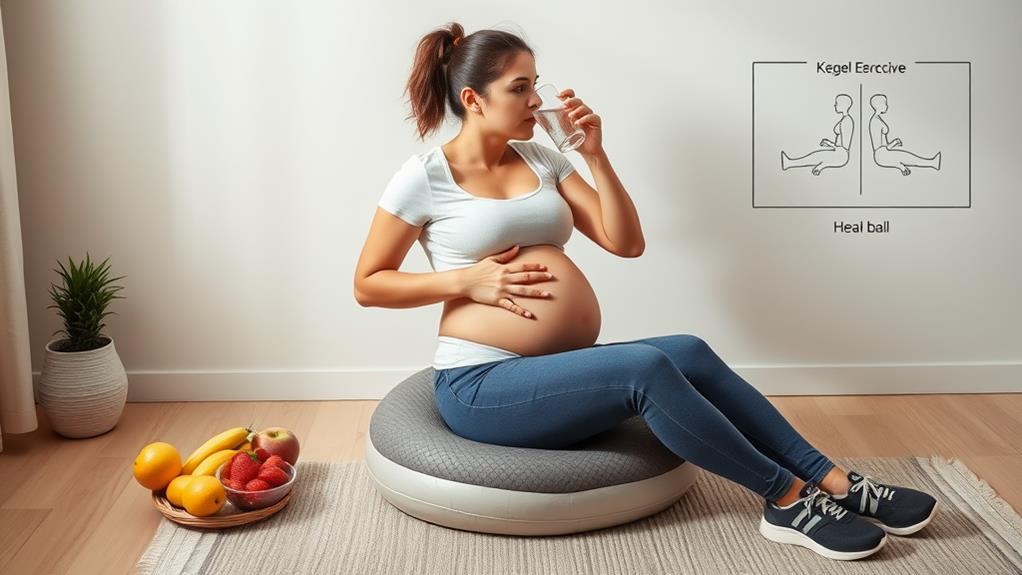As an Amazon Associate I earn from qualifying purchases.
Hemorrhoids during pregnancy are common, but you can prevent and manage them effectively. Focus on a high-fiber diet, stay hydrated, and exercise regularly to avoid constipation. Take warm sitz baths, use cold compresses, and apply witch hazel to soothe discomfort. Kegel exercises can strengthen pelvic muscles and improve circulation. For relief, try over-the-counter creams or ointments. If symptoms persist, consult your healthcare provider for medical treatments like prescription medications or procedures. Remember to maintain good hygiene and avoid prolonged sitting or standing. By understanding the causes and implementing these strategies, you'll be better equipped to handle this pregnancy challenge.
Understanding Hemorrhoids During Pregnancy

During pregnancy, your body undergoes numerous changes, and hemorrhoids can be an unwelcome addition to the mix. Hemorrhoids are swollen veins in your anus and lower rectum that can cause discomfort, itching, and bleeding. While they can occur at any time, they're particularly common during pregnancy, especially in the third trimester.
As your uterus grows, it puts increased pressure on the veins in your pelvic area, including those around your anus. This pressure, combined with hormonal changes and constipation (another common pregnancy symptom), can lead to the development or worsening of hemorrhoids. The strain of pushing during childbirth can also exacerbate existing hemorrhoids or cause new ones to form.
You're more likely to experience hemorrhoids if you've had them before pregnancy or if they run in your family. While they can be uncomfortable, hemorrhoids during pregnancy are usually temporary and often resolve on their own after delivery. However, it is vital to understand their causes and symptoms to manage them effectively and prevent complications. Recognizing the signs early can help you take appropriate steps to alleviate discomfort and seek medical advice if necessary.
Common Causes and Risk Factors
During pregnancy, you're more susceptible to hemorrhoids due to several factors. Hormonal changes can weaken your veins, making them more prone to swelling and inflammation. Additionally, as your baby grows, the increased abdominal pressure puts extra strain on the blood vessels in your rectal area, further contributing to the development of hemorrhoids.
Hormonal Changes
Hormonal changes kick in during pregnancy, playing a significant role in the development of hemorrhoids. As your body prepares for the growing fetus, it produces increased levels of progesterone and relaxin. These hormones relax your muscles and ligaments, including those in your rectum and anus. This relaxation can lead to swollen veins in the rectal area, making hemorrhoids more likely to occur.
The hormonal shifts also contribute to slowed digestion, which can result in constipation during pregnancy. Straining during bowel movements puts additional pressure on the veins in your rectal area, further increasing your risk of developing hemorrhoids. To prevent hemorrhoids, it's vital to maintain regular bowel movements by staying hydrated and consuming a fiber-rich diet.
Your growing uterus adds to the problem by putting pressure on the veins in your pelvic area. This pressure, combined with the increased blood volume common during pregnancy, can cause the veins to become engorged and more susceptible to hemorrhoids. While you can't control these hormonal changes, understanding their impact can help you take proactive steps to minimize your risk of developing hemorrhoids during pregnancy.
Increased Abdominal Pressure
While hormonal changes play a significant role, increased abdominal pressure is another major factor contributing to hemorrhoids during pregnancy. As your uterus expands to accommodate your growing fetus, it exerts significant pressure on the surrounding organs and blood vessels in your pelvic area. This increased intra-abdominal pressure affects up to 85% of women in their third trimester, making it a common cause of hemorrhoids.
The growing uterus puts pressure on the veins near your anus and rectum, causing them to swell and become painful. This pressure can force the veins in the rectal area to bulge, leading to the formation of hemorrhoids. Additionally, the weight of your expanding uterus can compress the pelvic veins, further contributing to the development of these uncomfortable swellings.
As your pregnancy progresses, you may notice increased discomfort in your lower body, particularly in the anal region. This is often due to the mounting pressure on the veins in the anus, which can become more pronounced as your baby grows. Understanding this connection between increased abdominal pressure and hemorrhoids can help you take preventive measures and seek appropriate treatment during your pregnancy.
Recognizing Symptoms

Recognizing hemorrhoid symptoms during pregnancy is vital for timely treatment. You'll often notice itching, pain, or bleeding around the anal area, as well as swelling or lumps that may protrude. If you experience severe pain, excessive bleeding, or persistent discomfort, it's important to consult your healthcare provider promptly.
Common Hemorrhoid Indicators
Identifying hemorrhoid symptoms during pregnancy is essential for timely treatment and relief. As a pregnant woman, you may experience various signs indicating the presence of hemorrhoids. Common symptoms of hemorrhoids include itching, burning, and discomfort around the anus. You might also notice rectal bleeding, especially when wiping after a bowel movement. The area may feel swollen, tender, or painful, particularly when sitting or passing stool.
External hemorrhoids can be visibly seen as swollen, bluish lumps around the anal opening. They may cause more noticeable pain and discomfort compared to internal hemorrhoids. Internal hemorrhoids, on the other hand, are usually painless but can cause bleeding during bowel movements. You might see bright red blood on toilet paper or in the toilet bowl.
Other indicators include a feeling of fullness or pressure in the rectal area, difficulty cleaning the anal region after bowel movements, and anal leakage. If you experience persistent pain, excessive bleeding, or severe swelling, it's imperative to consult your healthcare provider promptly. They can accurately diagnose your condition and recommend appropriate treatment options safe for pregnant women.
When to Seek Help
Now that you're familiar with common hemorrhoid symptoms during pregnancy, it's important to know when professional medical help is necessary. While mild symptoms can often be managed at home, certain situations require you to consult your healthcare provider.
If you experience persistent or worsening hemorrhoid symptoms, especially when accompanied by rectal bleeding, severe pain, or signs of infection, don't hesitate to seek medical attention. Your healthcare provider can rule out any underlying conditions and develop a safe treatment plan tailored to your pregnancy.
You should also seek help if hemorrhoids interfere with your daily activities, cause significant discomfort, or lead to emotional distress. In cases of severe symptoms, such as excessive bleeding, intense pain, or difficulty controlling bowel movements, seek immediate medical attention to prevent complications.
Preventive Measures
Taking proactive steps can substantially reduce your risk of developing hemorrhoids during pregnancy. Focus on maintaining a diet rich in fiber, including whole grains, fruits, and vegetables. If you're struggling to get enough fiber, consider adding a fiber supplement to your routine. Stay hydrated by drinking at least 10 8-ounce glasses of water daily to keep your stools soft and prevent constipation.
Regular physical activity, like walking, can stimulate bowel function and reduce pressure on rectal veins. Avoid prolonged sitting or standing, as this can increase pressure on pelvic veins. Incorporate Kegel exercises into your daily routine to strengthen pelvic floor muscles and improve circulation in the rectal area.
Here are five key preventive measures to remember:
- Eat a high-fiber diet with whole grains and plenty of fruits and vegetables
- Stay hydrated by drinking at least 10 glasses of water daily
- Engage in regular physical activity, such as walking
- Avoid prolonged sitting or standing
- Perform Kegel exercises daily
Home Remedies for Relief

When hemorrhoids strike during pregnancy, several home remedies can provide much-needed relief. One of the most effective methods is taking a warm sitz bath several times a day. This simple technique can help soothe itching and reduce pain in the affected area. You can enhance the benefits by adding baking soda to the water for extra comfort.
Applying cold compresses or ice packs to the area can also help alleviate swelling and discomfort. For added relief, try using witch hazel medicated pads or creams, which can effectively reduce itching and pain. When using the bathroom, elevate your feet to minimize straining and discomfort.
To prevent constipation, which can worsen hemorrhoids, focus on eating a high-fiber diet and staying well-hydrated. If needed, consider using stool softeners to make bowel movements easier. Over-the-counter hemorrhoid creams can also provide temporary relief from symptoms.
Medical Treatments Available
While home remedies can offer relief, some pregnant women may need additional medical treatments for their hemorrhoids. If you've tried home remedies without success, it's time to consult your healthcare provider. They'll assess your condition and recommend appropriate treatments.
Your provider may suggest:
- Topical medications to reduce inflammation and pain
- Sitz baths with medicated solutions
- Prescription-strength hemorrhoid creams or ointments
- Rubber band ligation for more severe cases
- Sclerotherapy injections to shrink hemorrhoids
These medical treatments can effectively treat hemorrhoids during pregnancy when home remedies aren't enough. Your provider will consider your specific situation and the stage of your pregnancy when recommending treatment options. They'll guarantee the chosen method is safe for both you and your baby.
The American College of Obstetricians and Gynecologists advises seeking medical attention if you experience severe pain, bleeding, or persistent symptoms. Remember, it's crucial to address hemorrhoids promptly to prevent complications and guarantee your comfort throughout pregnancy. Don't hesitate to reach out to your healthcare provider if you're concerned about your symptoms or need additional support in managing rectal discomfort.
Lifestyle Adjustments

Several lifestyle adjustments can substantially reduce your risk of developing hemorrhoids during pregnancy or alleviate existing symptoms. One of the most effective strategies is eating a high-fiber diet rich in whole grains, fruits, and vegetables. This approach helps prevent constipation, a common contributor to hemorrhoids during pregnancy.
Drinking plenty of fluids is equally important. Aim for 10 8-ounce glasses of water daily to keep your digestive system running smoothly and reduce constipation risk. You'll also want to avoid prolonged sitting or standing, which can increase pressure on your pelvic veins. Take regular breaks to rest and change positions throughout the day.
Engaging in regular physical activity, such as walking, can stimulate bowel function and reduce pressure on rectal veins. This not only helps prevent hemorrhoids but also promotes overall health during pregnancy.
Lastly, practicing good hygiene is vital. Always wipe from front to back after using the bathroom and pat the area dry after bathing or bowel movements. These simple habits can prevent irritation and infection of existing hemorrhoids, making your pregnancy more comfortable and reducing the likelihood of complications.
Postpartum Hemorrhoid Care
After giving birth, you might find that your hemorrhoids don't immediately disappear. The good news is that they usually resolve on their own within a few weeks. However, it's vital to continue practicing good habits to promote healing and prevent future occurrences.
To care for your postpartum hemorrhoids:
- Maintain a high-fiber diet and stay hydrated
- Engage in regular physical activity
- Apply witch hazel pads or use hemorrhoid cream
- Resume Kegel exercises to strengthen your pelvic floor
- Consult your healthcare provider if symptoms persist or worsen
These practices will help reduce straining, improve circulation in the anal area, and promote overall healing. Kegel exercises are particularly beneficial, as they strengthen the pelvic floor muscles and can be resumed soon after delivery.
Remember to continue eating a fiber-rich diet and staying hydrated to maintain regular bowel movements. This will help reduce swelling and discomfort in the affected area. If your healthcare provider recommends it, you can use over-the-counter treatments like hemorrhoid creams or suppositories to alleviate pain and itching. By following these postpartum hemorrhoid care strategies, you'll be well on your way to a comfortable recovery.
Frequently Asked Questions
How to Prevent Hemorrhoids During Pregnancy?
To prevent hemorrhoids, you'll want to focus on prenatal exercises, dietary changes, and constipation management. Increase your high fiber intake, maintain good pregnancy posture, strengthen your pelvic floor, and guarantee regular movement throughout the day. Don't forget to stay hydrated!
What Cream Is Good for Hemorrhoids While Pregnant?
You'll find relief with gentle formulas like witch hazel or hydrocortisone creams. Consult your prenatal care provider for hemorrhoid-soothing topical treatments. Natural remedies like aloe vera may help, but always check cream reviews and get professional approval before use.
When Should You Go to the Hospital for Hemorrhoids When Pregnant?
Like a ship in stormy seas, you're traversing pregnancy complications. Seek emergency care if you experience severe bleeding, unbearable pain, or persistent symptoms. Hospital admission may be necessary for proper pain management and obstetric care to safeguard your maternal health.
Is It Safe to Use Preparation H While Pregnant?
While Preparation H contains some safe ingredients, you should consult your doctor before using it during pregnancy. They'll consider pregnancy risks, stage, and medication interactions, and may suggest alternative remedies for your hemorrhoids. Don't self-medicate without professional advice.
Conclusion
You've now got the tools to tackle hemorrhoids during pregnancy. Isn't it empowering to know you can take control? Remember, prevention is key, but if you're already dealing with this pesky problem, don't hesitate to try home remedies or seek medical help. With proper care and lifestyle adjustments, you'll find relief and can focus on the joys of your pregnancy. Stay proactive, and you'll be sitting comfortably in no time!
Amazon and the Amazon logo are trademarks of Amazon.com, Inc, or its affiliates.
